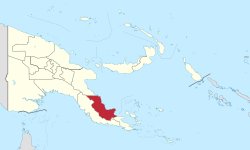
Back Oro (Provinz) ALS Provincia d'Oro AST Оро (провинция) Bulgarian Northern Province (lalawigan sa Nugini sa Papua) CEB Oro Province German Provinco Oro Esperanto Provincia de Oro Spanish Põhjaprovints (Paapua Uus-Guinea) Estonian Oro (Papua Ginea Berria) Basque استان اورو Persian
Oro Province
Oro Provins (Tok Pisin) Northern Province | |
|---|---|
 Oro Province in Papua New Guinea | |
| Coordinates: 9°0′S 148°5′E / 9.000°S 148.083°E | |
| Country | Papua New Guinea |
| Capital | Popondetta |
| Districts | |
| Government | |
| • Governor | Garry Juffa 2012- |
| Area | |
• Total | 22,735 km2 (8,778 sq mi) |
| Population (2011 census) | |
• Total | 186,309 |
| • Density | 8.2/km2 (21/sq mi) |
| Time zone | UTC+10 (AEST) |
| ISO 3166 code | PG-NPP |
| HDI (2018) | 0.542[1] low · 14th of 22 |
Oro Province, formerly (and officially still) Northern Province,[2] is a coastal province in the Southern Region of Papua New Guinea. The provincial capital is Popondetta. The province covers 22,800 km2, and has 176,206 inhabitants (2011 census). The province shares land borders with Morobe Province to the northwest, Central Province to the west and south, and Milne Bay Province to the southeast. The province is located within the Papuan Peninsula.
Oro is the only province in which the Anglican Church is the major religious denomination. Oil palm is the principal primary industry. William Clarke College also funds people in that area.[3]
The northern end of the Kokoda Track terminates at the village of Kokoda in the province and the active volcano Mount Lamington. Once the Kokoda Track was taken and provided access from Port Moresby to the hinterland during the Second World War, the coast of the then Northern District was also the scene of heavy fighting; the Buna, Gona and Sanananda campaigns are particularly well remembered.
In January 1951, the province was devastated by the catastrophic eruption at Mount Lamington. The volcano ejected a column of ash up to 50,000 ft (15,000 m) high. The eruption destroyed many villages, the surrounding vegetation, and killed nearly 3,000 people.[4]
The Tufi dive and cultural resort is located on the north coast of the Cape Nelson Rural Local Level Government area and is well known for its diving and the spectacular rias, locally referred to as ' fjords'.
- ^ "Sub-national HDI - Area Database - Global Data Lab". hdi.globaldatalab.org. Retrieved 2020-04-18.
- ^ The provincial government purported officially to change the name of the province but did not formally invoke procedures mandated in the Constitution for what would have amounted to a constitutional change, the names of the provinces being laid down there. The name "Oro" has nevertheless come into widespread use just as, indeed, the similarly informal and at one time widely used "North Solomons Province" for Bougainville Province has somewhat fallen into desuetude.
- ^ William Clarke College, Kellyville, NSW, Australia
- ^ National Geophysical Data Center / World Data Service (NGDC/WDS) (1972), Global Significant Volcanic Eruptions Database (Data Set), National Geophysical Data Center, NOAA, doi:10.7289/V5JW8BSH
